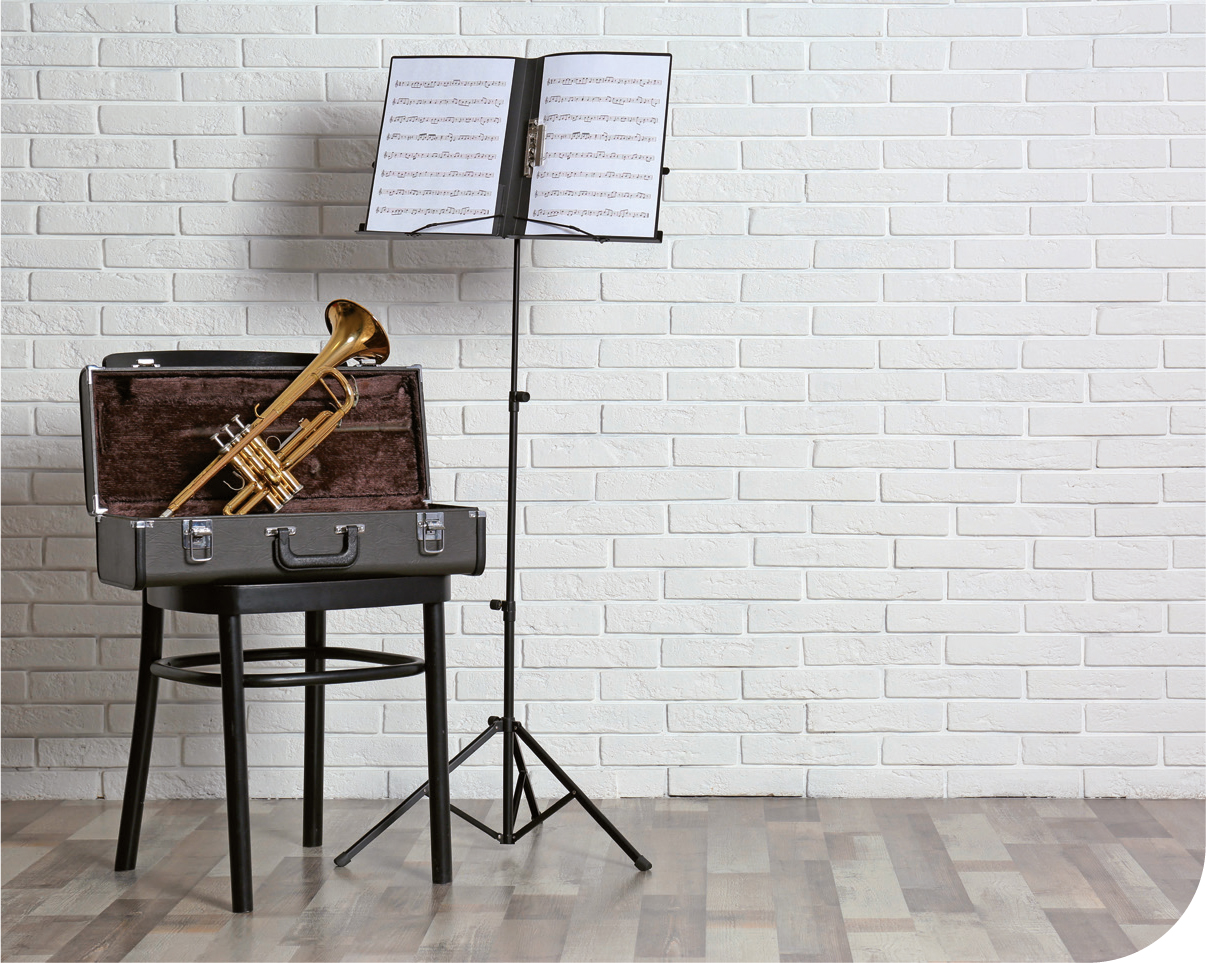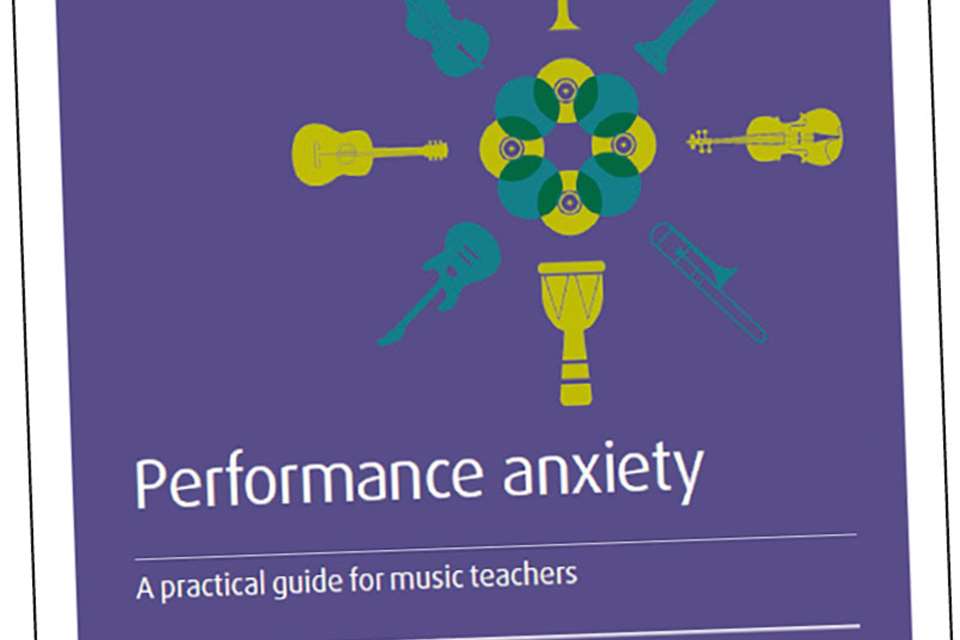Teaching in tune: How to support students with performance anxiety
Harriet Clifford
Saturday, January 1, 2022
Many instrumental and vocal students suffer with performance anxiety, whether or not you (or they) label it as that. Harriet Clifford speaks to Amy Littlewood who, with her performance mentor hat on, shares how teachers can support young players with their mental health.

disq/AdobeStock
Almost everyone knows what it feels like to be nervous about a performance. Maybe you're still haunted by the butterflies in the pit of your stomach as you counted down the minutes to a French speaking exam at school; maybe you've resigned yourself to planning your outfit on ‘big’ days at work (including visits from Ofsted) based on whether sweat patches will show on the material; or maybe you're all too familiar with a trembling sensation in your legs as you stand up to perform in a concert or music exam. Because these feelings of nervousness, or anxiety, are relatively common, most of us tend to pass them off as ‘just a few nerves’, stoically swallowing the belief that they're ‘normal’, won't last long, and can be ignored if we grit our teeth hard enough.
Far from being something that can be swept under the carpet, performance anxiety can be debilitating for some musicians. Amy Littlewood, associate second violinist with City of Birmingham Symphony Orchestra (CBSO), principal second violinist with Orchestra of the Swan, freelance musician, and teacher, says that she felt the effects of performance anxiety as far back as she can remember. ‘I never felt like I came alive on stage,’ she adds. Having met the late Karen O'Connor at both CBSO through her father and at the Royal Birmingham Conservatoire when she studied there, Littlewood became interested in learning about how to effectively manage performance anxiety, both in herself and in her students.
‘I don't think any person would expect to go through life without feeling any anxiety, because that wouldn't make us human,’ says Littlewood. ‘But I think the answer is to feel equipped and like you have something to throw at it, rather than just feeling completely helpless.’ Now a performance mentor alongside her other roles, Littlewood aims to raise awareness of performance anxiety so that future generations of musicians are better equipped to help themselves or seek help from elsewhere. She also hopes to encourage music teachers to create a learning environment that fosters open communication rather than shame, realism rather than perfectionism, and compassion rather than self-criticism.
 Credit: New Africa/AdobeStock
Credit: New Africa/AdobeStock
Music industry knowledge
‘In our industry, there's a blind spot,’ says Littlewood. ‘We don't really talk about performance anxiety because there's a perception around weakness. In music, any weakness that we have, we deal with it privately – if there's anything we can't play, we go into our own private practice room and we deal with it, and we never express it. I think that feeds into performance anxiety.’ Despite music performance by its very nature being an ideal stimulant for anxiety, Littlewood feels that there is currently a ‘lack of support’ in this area. ‘A lot of people think that if you have a problem that's not a “playing” problem, you can go to your doctor or speak to a counsellor. But to speak to somebody who really gets the industry, who's “in on the scene” and understands the pressure, I think is really important.’ Littlewood points out that the approach is very different in sport, where it's almost a given that a professional athlete or player will work with a performance coach, and sport psychology is a well-respected career path. ‘It's very well developed, and it's really celebrated,’ she says. ‘We just don't seem to have the same openness or conversations in our music world.’
Despite the differences with the sports industry, performance psychology is, of course, not a completely taboo topic in music; in 2018, Sara Ascenso was appointed by the Royal Northern College of Music (RNCM) as the UK's first lecturer in musicians' health and wellbeing. Speaking in an interview published on RNCM's blog at the time of her appointment, Ascenso said: ‘The role's main mission is to continue to develop the health and wellbeing provision across the RNCM, ensuring that it is holistic, tailored to musicians' needs, research-based and embedded in the curriculum.’
Embedding performance coaching into the curriculum is something Littlewood is keen to see happen, ideally before students get to a conservatoire: ‘We need to have the right conversations at the right stages; so with students in music college, or in music centres before you go to music college. If we make it normal, and conversations between students are encouraged, then we'll be nurturing openness in the next generation of musicians coming through the system.’
Open communication
At some point during our conversation, I ask Littlewood to clarify whether ‘performance anxiety’ can be used interchangeably with ‘anxiety disorder’. ‘I wouldn't make a blanket statement that if somebody presents with performance anxiety then they have an anxiety disorder, but more often than not, we're talking about an anxiety disorder of some kind. In terms of how we move forward and how we tackle it, it's very much down that line,’ she says. She adds that while some people will only experience anxiety when performing, rather than it being with them in other areas of their lives, that doesn't necessarily mean that the issue should be dealt with differently.
The physical symptoms of anxiety (see boxout below) present an ‘extra layer of complexity’ for musicians, depending on the instrument they play and which symptoms they experience. A dry mouth would be uncomfortable but not debilitating for a cellist but would be likely to negatively impact a clarinettist's performance, for example. Understanding these symptoms and their common causes (see second boxout below) is an important part of how music teachers can support their students.
Common symptoms of anxiety
- Feeling nervous, restless or tense
- Experiencing a sense of impending danger, panic or dread
- Having an increased heart rate
- Breathing rapidly
- Feeling hot and sweaty
- Trembling
- Dry mouth
- Feeling weak or tired
- Having trouble concentrating
- Insomnia
- Experiencing gastrointestinal problems
Once this is on your radar, how can you teach in such a way that nurtures positive mental health in your students, particularly in the context of performance anxiety? Creating an environment of open communication in your teaching practice is a starting point, says Littlewood: ‘It's important to be in tune with the person you're teaching and have open communication with them so that they know they can talk.’ Adding that teachers have a ‘massive responsibility’ not to feed perfectionist tendencies in their students, Littlewood says: ‘I'm always very aware that in my lessons, I'm trying to train my students to play all the notes and rhythms correctly – everything is tick, tick, tick.
‘You're also teaching them that if they make a mistake, that's not good. But when they come to do their exam, if they play something wrong, they panic because it's not perfect, and that causes anxiety. It's about injecting the right balance so that you're realistic with them and help them recover from mistakes rationally without being too emotional about it.’ This is easier said than done, but it's helpful for teachers to try and gain an understanding of where the perceived threat is coming from for each student. Are they inherently anxious? Have they had a bad experience? Is the pressure external? Knowing the roots of the issue will help a teacher know what approach they should take, but Littlewood suggests tackling performance anxiety from multiple angles, focusing on preparation and performance training.
Common perceived threats (causes)
- Letting someone down, e.g. a parent or a teacher
- Being judged
- Experiencing physical symptoms (shaking, dry mouth, etc.) that affect performance
- Going wrong
- Being unable to focus
- Not winning the competition or doing well in an exam
- Not playing as well as able to
- Forgetting the music
- Fear of the unknown
- Worrying about the worry and its effects
Planning ahead with students
Pressure training is one part of this, which, in basic terms, involves preparing a student for the high-pressured environment of an exam or performance, perhaps through implementing more mocks for students who struggle with performance anxiety. ‘Have you trained them to relax in the moment?’ asks Littlewood. ‘Teachers will always say, “just take five seconds before you play”, but it's helpful to explain what the student should be doing in that five seconds: collecting their thoughts, releasing any points of tension, thinking about their breathing.’ She adds: ‘Visualisation is also something that teachers can help with,' – supporting a student to picture themselves walking into an exam and being calm, taking their time, and approaching the first note. ‘You can almost see yourself doing it and the brain has started to make connections.’
A similar technique can be used to come up with a plan for if something does go wrong. ‘A lot of people fall apart if they make a mistake, but we can encourage going wrong, and then support the student to combat the mistake,’ says Littlewood. The hope is that in the moment of high stress, the student will know what to do and will feel equipped. ‘There's also something I call panic practice,’ she continues. This is when, in the run up to an exam or performance, a student will play the hard bits repeatedly and worry about them. ‘How they're doing it is not calming them down or sending a positive message; it's winding them up and they don't trust that that part is going to go okay. If we make sure that proper practice methods are in place, it feeds confidence and self-trust.’

Different reality
While it is possible to implement all these methods into your teaching practice, it's also important to know when the support required by a student goes beyond your capabilities. Littlewood recommends that a teacher should signpost a student to more specialist services if they ‘feel like there is enough discomfort' and the anxiety isn't ‘resolving reasonably quickly’. Although someone with an understanding of the music industry is preferable, it might be that a student is struggling in everyday life and would benefit from seeing a doctor or a therapist for more specialist treatment.
Finally, I ask Littlewood whether she still experiences performance anxiety now. ‘I'm definitely one of those people for whom anxiety doesn't just present when I'm on stage – it's part of my personality and I carry that in all sorts of contexts. For me, it's a matter of learning how to cope with that and, like anything in life, there are times when the anxiety is more severe than others.’ She adds: ‘It will always be part of my personality, unless I'm going to change who I am, which is unlikely. But when I think back to when I had no coping strategies, my reality is totally different now.’
Supporting students to develop their own coping strategies, unique to their personal experiences of performance anxiety, should be an integral part of an instrumental teacher's practice if we want to raise up a compassionate and resilient generation of musicians. Performance anxiety will always impact some players to some degree – as Littlewood likes to remind herself regularly, we are a person first and a performer second.




